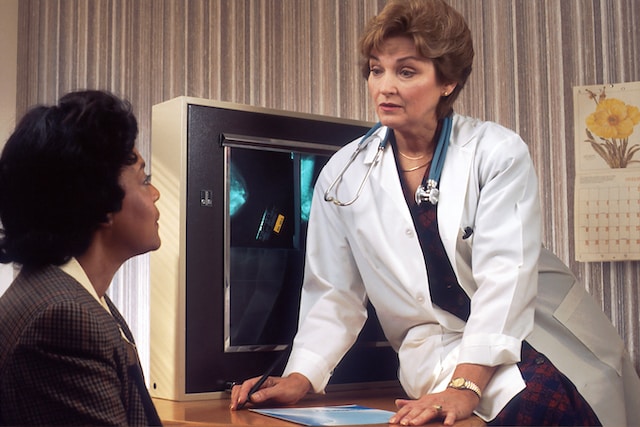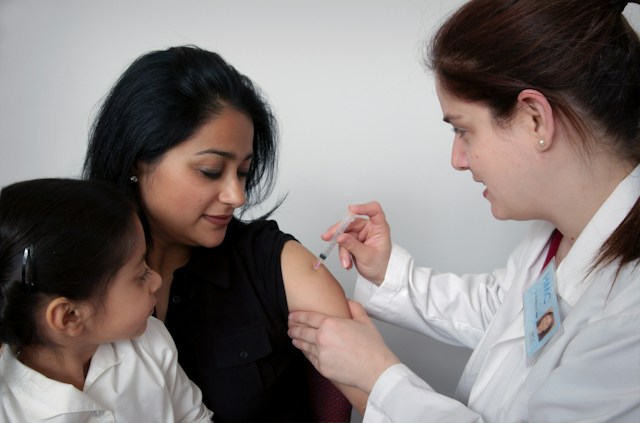Nurse practitioners provide a huge range of healthcare treatments and services aimed at women. Their scope of practice extends to managing many of the more complex medical issues that affect women, as well as those that tend to be more common. In the majority of US states, nurse practitioners are authorized to work independently without any form of supervision. Supporting the healthcare and wellness needs of both cis and trans women, they work with a wide age group that spans adolescents, pregnant adults, and seniors. Although the majority of their work tends to focus on childbearing and gynecology, nurse practitioners have the experience and expertise to deal with any health issue a woman might face.
Nurse practitioners in this field have a busy role and often see multiple patients over the course of a day. In part, that is because many women choose to see a nurse practitioner (NP) instead of another health professional, such as an obstetrician. This is often because NPs have a more holistic and collaborative attitude when it comes to women’s health and will address their overall wellness rather than individual symptoms. Registered nurses who feel like this gratifying career could be right for them can now train to become nurse practitioners through online learning at education providers like the University of Indianapolis. This gives them the option to study from home, fit their qualification around their current commitments, and pay a more affordable fee for their education compared to those charged by traditional universities.
In the online Master of Science in Nursing – Family Nurse Practitioner (MSN-FNP) program at the University of Indianapolis, students are taught core nurse practitioner skills through coursework, clinical placement, and an on-campus clinical skills course. Studying part-time, nurses can work while they qualify and expect to graduate within two years and seven months. Once they are ready to find their first role, nurse practitioners will take on a range of unique positions in healthcare. They will not only diagnose and treat ailments but also provide a listening ear, as they are trained to understand the emotional impact certain conditions can have on women.
Keeping mother and baby healthy with prenatal and postpartum care
Prenatal care is essential for the health of a mother and her baby. According to the Office on Women’s Health, without professional care at this crucial stage, babies are more likely to have a low birth weight or even die compared to those whose mothers accessed healthcare while pregnant. This is because nurse practitioners are trained to identify any problems or complications early, and it’s far easier to do so when they see mothers at regular intervals during their pregnancy. Should complications occur, they can refer a woman to a physician or a hospital and ensure she and the baby are treated early.
Nurse practitioners arrange for medical intervention to take place as soon as possible to cure any issues before they become worse and to prevent other problems from taking hold. Nurse practitioners work in a similar way to obstetricians, midwives, or gynecologists. As well as diagnosing conditions, they can refer patients, order further testing, and prescribe medication as required. Once the baby has arrived, NPs can provide comprehensive postpartum care, advising the new mother on how to look after herself and her baby. They will arrange a schedule of postnatal visits, discuss eating for good health, provide information on breastfeeding, and advise on danger signs, such as serious blood loss.
Offering reproductive health education
NPs provide education and advice on reproductive health to keep their patients well, help them avoid unwanted pregnancies, and ensure they have access to contraception when they want it. NPs can offer reproductive education at an age-appropriate level for girls and women, as well as offering guidance on contraceptives, pre-conception screening, and more.
Their work is aimed at ensuring every woman has a healthy body and can make educated, autonomous choices about reproduction, as well as avoiding sexually transmitted diseases. Sexual health is part of a woman’s overall health, so NPs help them manage the risks associated with having sexual partners and becoming pregnant. They also provide medical care that is aimed at treating infections of the reproductive system, such as those that have been sexually transmitted.
Finally, when women are planning to have a baby, an NP can give advice that improves their chances of falling pregnant. Even before a woman becomes pregnant, there are pre-conception health checks that can be carried out to ensure a woman is well and has every chance of carrying a healthy baby. Although there is no diet that guarantees a swift conception, NPs are likely to suggest eating healthier foods and getting regular exercise in preparation for carrying a baby. NPs can also provide tailored advice for women who are over 40, as they tend to be less fertile than younger mothers.
Providing emotional support and mental health care for women
Nurse practitioners have a scope of practice that includes offering mental health support to the women who attend their office. As they work in primary care, NPs are often the first medical professionals to see women who are experiencing an issue with their mental health. They are trained to diagnose some of the less complex mental health issues that a person may start to experience, as well as provide treatment or make a referral if necessary. Specialist referrals are standard if the NP feels that the issue is outside of their knowledge.
However, when possible, NPs always take a holistic approach to care, and that includes spending time with patients discussing their mental health. Part of this is the provision of preventative care. Just as they might suggest more exercise to a patient who is hoping to lose weight, an NP can offer advice for those who want to improve their mental health. This could include giving advice about eating healthily and reducing stress, suggesting the patient take part in clubs and community events or learning new skills.
NPs can screen for mental health issues in the same way as they would a physical complaint. This will often include giving out questionnaires that might suggest a person has depression or another issue, such as ADHD. These will involve questions about moods, life changes, stress factors, and feelings. Finally, NPs can order blood tests to find out if a woman’s mental health is being impacted by a physical problem, such as an underactive or overactive thyroid.
Support during the menopause and hormone replacement therapy (HRT)

For some women, menopause can bring on a range of uncomfortable, distressing, and painful symptoms, as well as affecting their emotional health. Women go to their NP at this time for support and to find ways of dealing with the health issues they are experiencing. NPs will explain more about what menopause is and offer advice on the treatments available, as well as the side effects.
HRT is often offered, but it has been associated with a higher risk of breast cancer, and many women are unsure of whether to take it or not. An NP will explain the benefits of hormone therapy, as well as the risks, and allow their patient to make an informed choice about how to move forward.
Counseling for family planning
Women who are planning to start a family can visit their local NP to get information on having a healthy pregnancy. Sometimes, patients are with a partner, but they do not want to have a baby. In these cases, a family planning appointment would focus on contraception. However, if the woman is considering pregnancy, then the NP can give advice on increasing her chances of conception. These could include lifestyle changes, taking medications, and information on how a patient with a long-term condition can plan their pregnancy.
Once again, NPs are integral to the process of family planning because they aim to care for the whole woman. They do this by addressing the emotional, physical, and mental health of each patient throughout the time they are trying to get pregnant and while they are carrying. Moreover, as they are often the first health professional a woman comes to when they find out they are pregnant, NPs are an important link between the wider US healthcare system and the communities they serve. This means they often shoulder a degree of responsibility when it comes to educating first-time parents, getting them engaged with appropriate services, and helping them to make the right decisions about their care. They do this by getting to know their patients, understanding their viewpoints and experiences, and advocating for them when necessary.
Helping women to manage gynecological conditions
Nurse practitioners assist women from adolescence through to adulthood and into menopause to overcome sexual health risks, manage hormonal problems, and have safe, healthy pregnancies. They do this through the primary care services offered at their private practice or in larger clinics. Women can attend an appointment to have regular general check-ups, receive education, and have immunizations or gynecological screenings. When screening shows a result that is abnormal in some way, the NP will connect the patient with a specialist clinic.
As well as delivering basic care and preventative medicine, NPs offer women help with avoiding or recovering from a sexually transmitted disease or other conditions such as polycystic ovary syndrome and endometriosis. They can also diagnose and arrange a treatment plan for women suffering from anemia, pelvic inflammatory disease, and fibroids. NPs are also trained to support women who have certain forms of cancer, including cervical cancer, breast cancer, and ovarian cancer.
Many of the gynecological conditions that women can experience are either preventable or easy to treat when they are found at an early stage. That’s why examinations and testing, as well as information on breast self-examinations and choosing the right birth control, are essential.
Advocating for the women in their care

Women’s bodies require specialized care in order to stay healthy and pain-free throughout their lives. From the complications that can occur as a result of menstruation to family planning choices, pregnancy, and menopause, there is a lot to consider. In the US, women’s life expectancy is nearly 80 years old, so it’s clear that most are living long and healthy lives despite an overall reduction in life expectancy in the US.
In the past, some issues surrounding women’s health, for example menstruation, were rarely discussed. Even if they were experiencing pain or discomfort, women were simply expected to get on with life. However, attitudes have changed, and thanks in part to the work of NPs, women can now expect to receive excellent care and be advocated for by a medical professional.
This could be through ensuring that women are safe when they undergo treatment in a facility and that when they get home, there is someone to support them. NPs will also make a stand when it comes to their patient’s rights and give women who feel vulnerable a voice, especially when they require a second opinion or cannot understand the treatment plan that has been designed for them.
Much of the NP’s advocacy work will take the form of educating women on how to manage the condition they are living with and which symptoms might need further investigation. If women are taking any medication, such as birth control pills or HRT, the NP can offer advice on the most effective methods of doing so. Finally, NPs can connect women to resources outside of a medical setting, such as community support groups and networks that could make their lives easier or meet a certain need.
Delivering gender-specific, targeted healthcare
Nurse practitioners offer comprehensive medical services that are designed to manage almost all aspects of women’s healthcare. This approach is useful because it brings together all the care women need in one place, rather than having to visit a physician and a gynecologist separately. Gender-specific care is less about a physiological difference; instead, it encompasses trans and cis women to address wellness from their gender-specific perspective. In doing so, nurse practitioners who specialize in women’s health take a more nuanced and personalized approach to delivering care. One that recognizes women’s health needs as different from those of men and is based on the latest research.
Featured Image by freepik.com
